NRL 2021: Melbourne Storm close in on 1975 Roosters’ win streak, Paul Kent
With Storm just one win from surpassing the Roosters’ 1975 winning streak, Craig Bellamy is closing in on Jack Gibson as the best ever coach, writes PAUL KENT.
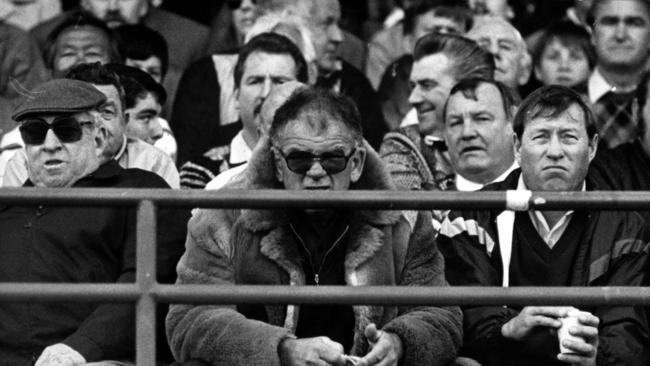
NRL
Don't miss out on the headlines from NRL. Followed categories will be added to My News.
Saturday night belongs to the Melbourne Storm and records that last.
The Storm shoot for 20 straight wins tonight to eclipse the record of Jack Gibson’s fabled 1975 Eastern Suburbs team and, once and for all, put the final exclamation point on Craig Bellamy’s coaching legacy.
The closer Bellamy nudges to Gibson’s reputation as the best ever the more the similarities emerge. In all the important areas, anyway.
The race to the 2021 NRL Telstra Finals Series is on and every game matters. Watch Live & Ad-Break Free on Kayo. New to Kayo? Try 14-days free >
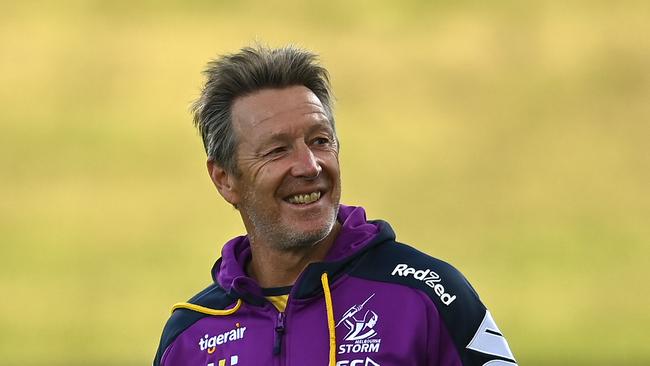
Gibson loved his players like no coach before him and took a deep interest in their lives.
There was a game all those years back and Jack, knowing its importance, banned his players from hitting the pub after training. They used to drink at the Phoenix Hotel in Woollahra.
Some preferred the habit of routine, though, and chose to ignore Gibson’s instruction and slip into the Phoenix for a couple promising to keep it quiet, knowing there waistless chance of Jack finding out that way.
Later in the evening, though, props Ian Baker and Kenny Jones got in an argument with each other and took it outside, the way it happened back then.
Johnny Mayes and Johnny Peard, who played in the halves and so were blessed with a higher intellect, knew what trouble this meant and shot for the door, going straight past Baker and Jones slugging it out on the footpath.
As luck would have it a copper pulled them up on the way home and breathalysed Peard, which came under the limit, but then issued him with a speeding ticket before sending him on his way. They’re nice fellows like that, always thinking of you.
Peard knew what this meant.
Jack was the most informed man in Sydney and Peard knew Jack would hear of the speeding ticket and possibly even the pub so the smart choice was to ring Jack once he was home and get in first.
Make like it was no big deal.
Jack listened, pleased Peard passed the breathalyser.
“I’ll see you Thursday night,” he said.

This was often the difference between Gibson and his players back then.
He understood the difference between being interested in his players lives and being invested in them, and he invested deeply, doing all he could to make life better.
He liked his players to have jobs, believing idle time created laziness. Out of work players were given a number of somebody to call, a friend of Jack’s who would help them out with a job.
“How’s the wife?” was a popular question. If the wife was happy he believed the player probably was, too.
Today, it is part of the job requirement to have an interest in every part of a player’s life and every club will claim this ground as a priority for them. But it does not always ring genuine, a case of having to do it because everyone else does it, and players are usually the first to smell it.
They were wild days, back then, and Gibson was opening new frontiers with his right hand man Ron Massey.
Ian Schubert was walking into training one day and saw a car pull up that looked like it had just flown in from Jupiter.
Out stepped a shabby old man who headed straight for the dressing room. Schubert later learned it was Kerry Packer, in a brand new Audi, the first of its kind in Australia.
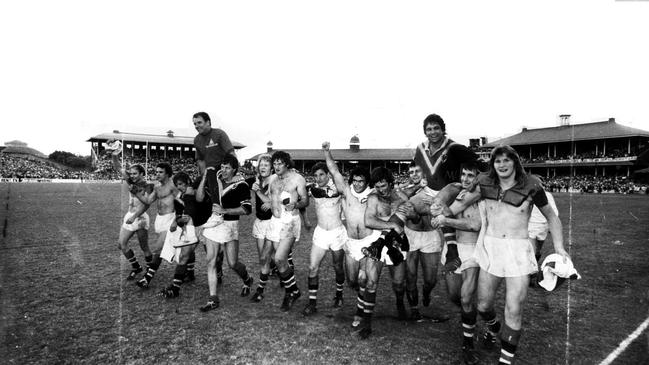
Packer and Gibson were friends from Gibson’s days as an SP bookie and Packer’s days as the country’s biggest gambler.
Schubert was a young men then but his memories are of nothing but good times.
Gibson and Massey would organise variety nights in the rooms underneath the old Sports Ground grandstand.
“It was hilarious, everyone had to do an act,” Schubert says. “Then we’d go for a beer and a feed after.”
The Roosters were divided into four teams through the three grades and Mick Souter would train them, making them compete with each other at everything. It was their way to encourage competitiveness.
Even the variety night.
“Jack and Mass would be the judges,” he says.
It created a bad that saw weekends off often spent at Ron Coote’s place for a barbecue, or at another place, or even a quiet beer at the Phoenix.
They played and socialised together.
The bond was such that years after Beetson died, with Jack gone three years earlier, Massey would sit at home and replay a message on his answering machine over and over, the only message he would not delete, from the day Artie died.
“Mass, it’s Arthur, I’m coming down. I’ll bring some pies and we’ll have some lunch with Patty.”
“Dad liked hearing his voice,” Paul Massey says.
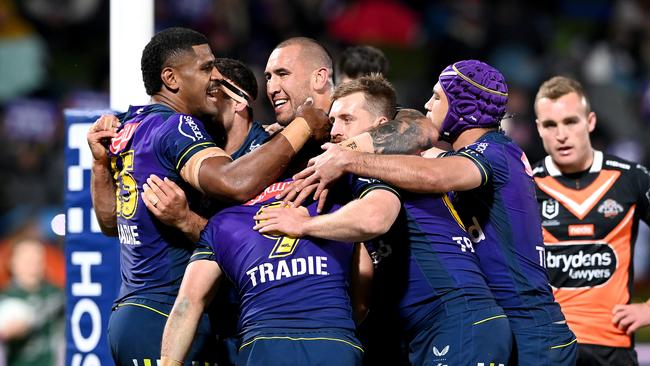
The stories, the connections, echo Melbourne in their Queensland bubble and a coach whose greatest concern is a genuine care for his players.
When Bellamy moved in to coach Melbourne he understood so many of his players were leaving home, to be in Victoria, so he worked hard to create a family environment barely matched.
His interest is genuine.
The Storm rode their Queensland bubble all the way to a premiership last season, the ordeal written up early as a trial but one the Storm now believe delivered them a tremendous advantage.
They shared time together they never would have done at home, the curse of the modern NRL club where players split from training and don’t see each other until the next session.
And now this team sits on the edge of history.
The Roosters did not even celebrate their record in 1975, barely even aware of what they had achieved.
“What the record was before and how long it had stood I don’t know,” says Schubert.
It was a record more than 60 years old, 16 in a row set by Easts in 1912-13 that equalled Souths in 1908-09.
Canterbury later reached 17 straight in 2002 but were cheating the salary cap, then Penrith matched it last year but, sadly, broke the streak when they lost the grand final.
What all the clubs shared, at least as far back as memory permits, was a bond with each other strong enough it was almost visual.
That is what pours from Melbourne, a care in each other that is visible, and which.
Bellamy understands it, like Jack always did.
Gibson cared for their lives and took an intimate interest in all that happened.
When Johnny Peard called that night all the years ago he let out a small whisper of thanks that Jack was so forgiving and that they were dodging the bigger trouble of what happened at the pub on a night when they should not have been out.
Then, just as they were hanging up, Jack pulled him up.
“By the way, Peardy,” Jack said.
“Yeah?”
“Who won the fight?”
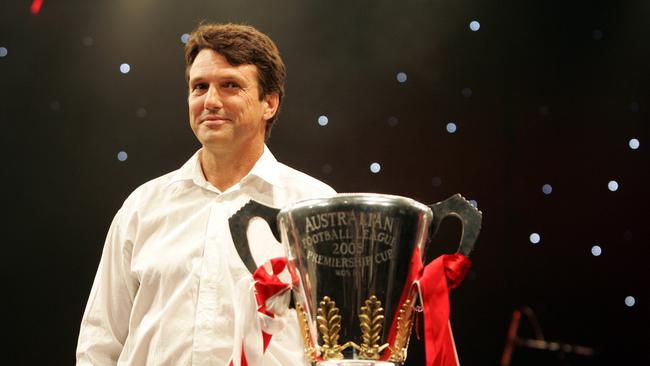
SHORT SHOT
When Paul Roos celebrated Sydney’s 2005 premiership one of the secrets, he revealed, behind the Swans’ success was their refreshing “No Dickhead Policy”.
Anyone bad for the joint was unwelcome.
Sadly, that policy is now dead under the mental health act.
Now, all the dickheads in the world simply claim their dickhead behaviour is a mental welfare issue and immediately it makes them no longer accountable for their dickhead actions.
And the bleeding heart lefties, searching for a cause, get behind them and turn their guns on anybody who dares question their dickhead behaviour, partly in a bid to attract publicity to their cause, and with no examination whether the behaviour was actually mental welfare or, yes, just dickhead behaviour.
Roos was celebrated for the stance, its no excuse philosophy, and teams around Australia quickly adopted the same mantra even though some, in reality, had difficulty identifying which was which. More than a few snuck in at some joints.
The speed at which players now grasp for the mental welfare card to deflect criticism, many who are playing at the top level of sport where mental toughness is as much a part of success as talent and skill, is the sign of our times.
Maybe they aren’t right for it all along.
More Coverage
Originally published as NRL 2021: Melbourne Storm close in on 1975 Roosters’ win streak, Paul Kent





